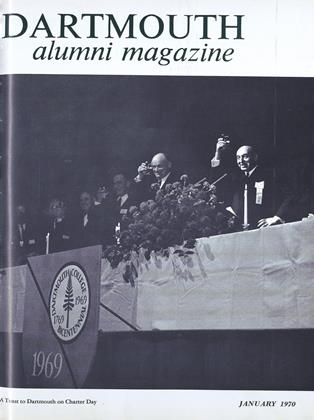THE College Committee on Standing and Conduct (CCSC) has placed 17 undergraduates on College Discipline (probation) for one term, without restrictions, for participating in the October 15 hand-clapping protest which prevented Dr. William Shockley of Stanford University from speaking at the fall meeting of the National Academy of Science held at Dartmouth. Dr. Shockley, a physicist and a Nobel laureate for his work on the transistor, had requested as a member of the Academy an opportunity to deliver a contributed paper on psychometrics in which he suggested that there might be genetic differences in intelligence among races.
The 17 students, all of whom are black, were charged by the College Proctor with violation of Dartmouth's regulation on "Freedom of Expression and Dissent." That regulation states that the exercise of the rights of freedom of expression and dissent "must not deny the same rights to any other individual." Originally nearly 30 students had started the clapping demonstration, but only 17 were judged to have persisted.
Before the CCSC took disciplinary action, tempered by what it called "extenuating circumstances," Dean Carroll Brewster had received urgent recommendations from the Judicial Advisory Committee for Black Students (JAC), which argued in a detailed 29-page report that no college penalty should be assessed and that charges against the students should be dismissed. The JAC was established last spring to consider and make recommendations on any disciplinary or academic cases involving black students requesting its intervention. It is composed of four black students and four members of the faculty, two of them black: Chairman Larry Stephens '70 of Roosevelt, N. Y.; Isaac Heard '71 of Charlotte, N. C.; Robert Carter '71 of Cleveland, Ohio; Larry Barr '72 of Charleston, S. C.; Henry W. Ehrmann, the Joel Parker Professor of Law and Political Science; Errol Hill, Professor of Drama and Associate Director of Theater; Jonathan Mirsky, Assistant Professor of Chinese; and Robert G. McGuire III '58, Instructor of Social Science and Coordinator of the Black Studies Program.
The J AC contended that the students were attempting to prevent what they felt to be slander against black people who, the committee stressed, have been made acutely sensitive to the injury done by derogation of the black race through much of history.
The JAC acknowledged that its findings would probably be controversial. But it concluded that "the Shockley incident has raised fundamental issues governing Constitutional principles on which the Republic was founded.... The Black Judiciary Committee, cognizant of the far-reaching implications of the case, was constrained to view the issues primarily in a legal context which would be applicable anywhere in the nation. But we are not a court of law; nor do we feel that the university is a place where appeal to the law on internal problems should be considered the sole standard for judgment."
In its action the College Committee on Standing and Conduct noted that the report of the JAC, which cites several scholarly works and legal cases, "is a serious one and has been taken seriously." But the CCSC concluded that the meeting of the National Academy of Science invited to Dartmouth "was an orderly process of the College within the meaning of the regulation of Freedom of Expression and Dissent and that by the clapping demonstration the 17 students had obstructed the right of freedom of speech." In the decision it was noted that "were it not for the extenuating circumstances, some of which were expressed in the report of the JAC, the penalty would have been more severe."
Following the decision by the CCSC, the eight members of the JAC resigned. In a memorandum addressed to the Dartmouth College Community, they stated, "Our 29-page report to the College concluded after rational argument that the students were not guilty for three basic reasons. First, free speech is not violated since Mr. Shockley's proposed speech amounted to group libel not protected by the Constitution. Second, the students acted in self-defense. Third, responsibility for the incident lay with all parties involved, with Mr. Shockley, primarily, but also with the Academy and the College as well as with the students. To single out for punishment students who were most likely to be harmed and insulted by the speech does in our opinion demonstrate an inflexible attitude on the part of the College. This makes any further activities of the Black Judieiary Committee futile."
 View Full Issue
View Full Issue
More From This Issue
-
 Feature
FeatureChanging Values in American Society
January 1970 By HAROLD L. BOND '42, PROFESSOR OF ENGLISH -
 Feature
FeatureCHARTER DAY, December 13, 1969
January 1970 -
 Feature
FeatureNew York Art Show Planned
January 1970 By H. ALLAN DINGWALL '42 -
 Article
ArticleThe Undergraduate Chair
January 1970 By WINTHROP A. ROCKWELL '70 -
 Class Notes
Class Notes1933
January 1970 By ERNEST S. DAVIS JR, GEORGE N. FARRAND -
 Class Notes
Class Notes1958
January 1970 By WALTER S. YUSEN, WILLIAM C. VAN LAW JR







